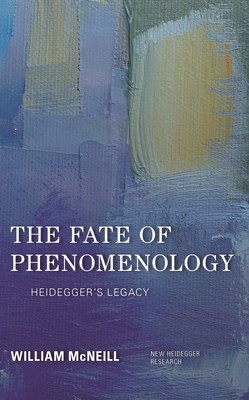
- We will send in 10–14 business days.
- Author: William McNeill
- Publisher: Rowman & Littlefield Publishers
- ISBN-10: 178660891X
- ISBN-13: 9781786608918
- Format: 15 x 22.6 x 1 cm, softcover
- Language: English
- SAVE -10% with code: EXTRA
Reviews
Description
It can be easily argued that the radical nature and challenge of Heidegger's thinking is grounded in his early embrace of the phenomenological method as providing an access to concrete lived experience (or "factical life," as he called it) beyond the imposition of theoretical constructs such as "subject" and "object," "mind" and "body." Yet shortly after the publication of his groundbreaking work Being and Time, Heidegger appeared to abandon phenomenology as the method of philosophy. Why? Heidegger was conspicuously quiet on this issue. Here, William McNeill examines the question of the fate of phenomenology in Heidegger's thinking and its transformation into a "thinking of Being" that regards its task as that of "letting be." The relation between phenomenology and "letting be," McNeill argues, is by no means a straightforward one. It poses the question of whether, and to what extent, Heidegger's thought of his middle and late periods still needs phenomenology in order to accomplish its task-and if so, what kind of phenomenology. What becomes of phenomenology in the course of Heidegger's thinking?
EXTRA 10 % discount with code: EXTRA
The promotion ends in 19d.03:17:01
The discount code is valid when purchasing from 10 €. Discounts do not stack.
- Author: William McNeill
- Publisher: Rowman & Littlefield Publishers
- ISBN-10: 178660891X
- ISBN-13: 9781786608918
- Format: 15 x 22.6 x 1 cm, softcover
- Language: English English
It can be easily argued that the radical nature and challenge of Heidegger's thinking is grounded in his early embrace of the phenomenological method as providing an access to concrete lived experience (or "factical life," as he called it) beyond the imposition of theoretical constructs such as "subject" and "object," "mind" and "body." Yet shortly after the publication of his groundbreaking work Being and Time, Heidegger appeared to abandon phenomenology as the method of philosophy. Why? Heidegger was conspicuously quiet on this issue. Here, William McNeill examines the question of the fate of phenomenology in Heidegger's thinking and its transformation into a "thinking of Being" that regards its task as that of "letting be." The relation between phenomenology and "letting be," McNeill argues, is by no means a straightforward one. It poses the question of whether, and to what extent, Heidegger's thought of his middle and late periods still needs phenomenology in order to accomplish its task-and if so, what kind of phenomenology. What becomes of phenomenology in the course of Heidegger's thinking?


Reviews